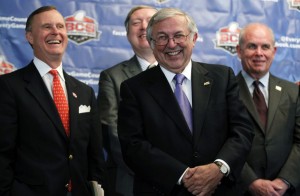 While you ponder the Shakespearian nuance of this title, know that I thought long and hard about just how scathing, how all-encompassing, and how damaging this post should be. As an NCAA athlete, I have to be careful what I say; the NCAA has a way of making whistle blowers go away. So in what follows, I’ll simply present some facts about the college football system and leave the business of conclusions to the reader.
While you ponder the Shakespearian nuance of this title, know that I thought long and hard about just how scathing, how all-encompassing, and how damaging this post should be. As an NCAA athlete, I have to be careful what I say; the NCAA has a way of making whistle blowers go away. So in what follows, I’ll simply present some facts about the college football system and leave the business of conclusions to the reader.
Earlier this week, the powers-that-be came to the decision to institute a 4-team playoff in college football. In their statements, they used words like fairness, and talked about wanting to maintain the tradition of college football while caring for the student-athlete. I got a little upset watching these white men in suits talk about their new plan. It wasn’t that college football didn’t need a 4-team playoff, and it wasn’t that I think the bowl system isn’t broken or that it doesn’t exploit the student athletes. I was upset because these old white men stand to make an obscene amount of money from all that caring they’re talking about, and the system is fundamentally flawed.
First, the guys playing the games don’t get paid. They’re the ones that make it all happen. They’re the ones risking injury, training around the clock, year round, exerting untold effort for the sake of the school and their school’s tradition, and they are not paid. Sure, some of the student-athletes are on big time scholarships, and they get to go to college for free. But it’s not a profitable enterprise considering the effort and time expected from a scholarship athlete. Oh, and they’re not gonna go pro, either.
So where is the money going? The NCAA is a non-profit company with revenue for the 2011 fiscal year totaling $824,098,841. That’s $824 million, or about $2 million less than the payrolls for the Orioles, Nationals, Indians, Rockies, Blue Jays, Diamondbacks, Rays, Pirates, Royals, Astros, Athletics, and Padres combined.
The combined pay for all NCAA college football referees was $245,045.
NCAA president Mark Emmert’s salary is $620,000.
The bowl tradition that the white men in suits wanted to maintain pays big bucks. Thirteen bowl executives make more than $240,000 annually, and three bowl officials make more than $500,000 a year, according to salary figures obtained by the Sports Business Journal.
According to the NCAA, upwards of 60% of their income is dispersed to participating conferences who then dole out the money to their member schools. This leaves at least the one middle man (the conferences) in a position to profit from the NCAA and begs the question: why does the NCAA national office need 19% of the income, and what exactly does the 4% titled “other expenses” entail.
The new playoff system is expected to bring in about $400,000,000 annually in TV rights. Over the course of the 12 year plan, the total package could be worth up to $5 Billion more than the currently negotiated BCS television contract.
Here is where the traditional blog writer spouts off about the total coruption of the NCAA and how college football players should be paid and/or deserve some portion of the income revenue generated by their play. I’m not going to do that. As a Division III baseball player, I have respect for a lot of what the NCAA does. I really enjoy playing baseball and can appreciate the need for the level playing field and sportsmanship that the NCAA’s sanctions and bylaws strive to bring about.
When this deal got signed, the white men in the suits probably looked at themselves and thought they have did right. After all, they brought fairness to college football for the first time. I have to ask though, how fair is the salary disparity between the players and anyone else involved? How fair is the revenue sharing dispersed through the conferences when people like University of Tennessee Athletic Director Dave Hart are paid $750,000 annually? Or UT’s football strength coach Ron McKeefery who makes $240,000? Or UT’s head football coach Derek Dooley who makes $2,000,000 while his players make nothing?
The white men in suits make millions while the black guys in pads make meal money.
-Sean Morash
Stat of the Day: This June, the NCAA has levied their newest regulation upon college basketball: unlimited calling and texting from the time the potential recruit finishes his sophomore year in high school until he signs his letter of intent.
(It’s a mostly baseball blog.)














